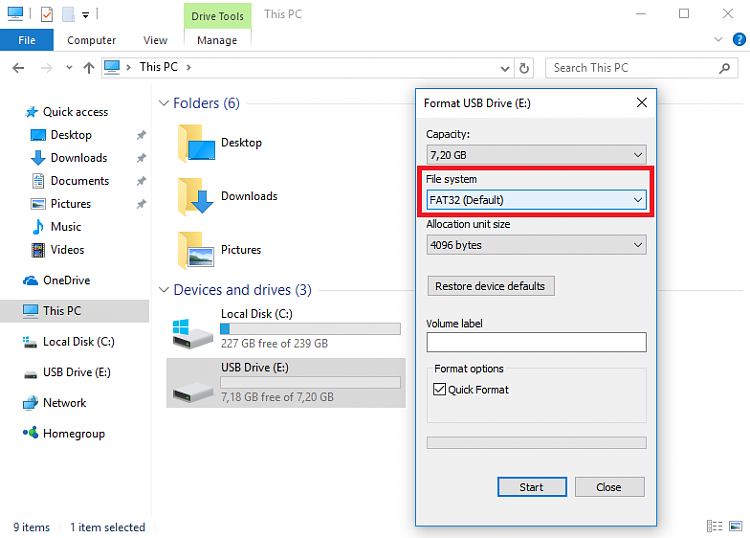Movie File Too Large For Flash Drive Mac

Oct 19, 2008 - Files larger than 4GB can NOT be stored on a FAT32 volume. Formatting the flash drive as exFAT or NTFS will resolve this issue. WARNING: Backup your data. Formatting will delete all the data in your device.
The overwhelming majority of USB flash drives you buy are going to come in one of two formats:. The first format, FAT32, is fully compatible with Mac OS X, though with some drawbacks that we'll discuss later. If the drive comes formatted in NTFS, which is the default file system for Windows, you're going to want to re-format the drive because Mac OS X can't write files to NTFS-formatted volumes (at least not without a bunch of extra work that's beyond the scope of this article). How do you tell which format your brand-new USB drive has? Hook it up to your Mac and launch the Disk Utility app, located in your Utilities folder (which is in Applications). Your new drive should appear in the left-hand column, and clicking the 'Partition' tab will bring up info on the drive which includes its current format. If the drive's format comes up as MS-DOS (FAT) or, less likely, ExFAT, you may be able to simply leave the drive as-is and not bother reformatting it.
If the drive is listed as NTFS-formatted, you're going to need to format it to something else if you want full compatibility with Mac OS X. There are several possible file system formats you can use for a USB flash drive, and changing them in Disk Utility is as easy as selecting the number of partitions you want on the drive (usually just one), picking the format you want for the drive, and clicking 'Apply.' Note that this will erase all information on the drive, so make absolutely sure you've got copies of everything before moving forward. Disk Utility gives you five different choices for drive formats in OS X Lion. Unless you have extraordinary needs, you can safely ignore two of them: Mac OS Extended (Case-sensitive, Journaled) and Free Space. Newest operating system for windows. I'll discuss the advantages and disadvantages of the other three formats below. Mac OS Extended (Journaled) - This is the default file system format for Mac OS X drives.
Advantages: Formatting your USB flash drive this way will give you full interoperability with Macs. It also includes support for features from OS X Lion, such as.
You can even if you have the right files, the know-how, and a big enough flash drive, which will allow you to boot your Mac off an external disk if something goes wrong with your built-in drive. The 'Mac OS Extended (Journaled)' option will have the highest degree of support for Mac OS X features, and there's no limit to the size of files you can put on the drive. Disadvantages: Windows-running PCs can read files from drives formatted this way, but they can't write to them (at least not without the same amount of work it takes to get OS X to write to NTFS-formatted drives). If you're transferring files from Macs to PCs, this won't be an issue; however, transferring files from PCs to Macs won't be possible if your drive is formatted in 'Mac OS Extended (Journaled).'
Kigo M4V Converter for Mac is Powerful M4V video format converter, which can convert purchased m4v videos to QuickTime, MP4, iPod, iPhone, AppleTV, or audio format in high speed and great quality. What does he trial version of download kigo m4v converter for mac let you don t. Kigo M4V Converter for Win is a multifunctional M4V video format converter.As a professional iTunes M4V Converter, It uses multiple-speed recording technology to record M4V, then encode to unprotected video format, like MP4, AVI, FLV, 3GP, MPG with high quality and fast conversion speed. Kigo M4V Converter for Win is a multifunctional M4V video format converter.As a professional iTunes M4V Converter, It uses multiple-speed recording technology to record M4V, then encode to. Kigo M4V Converter version 1.0.4 for Windows XP/Vista/7 was listed on Download.hr on and it is marked as Shareware. All software products that you can find on Download.hr, including Kigo M4V Converter, are either free, freeware, shareware, full version, trial, demo or open-source.
If you will only be working with Macs and not PCs, this may not be an issue. Otherwise, you may need to consider one of the file formats discussed below. MS-DOS (FAT) - This is Disk Utility's name for the FAT32 filesystem. Advantages: FAT32 offers near-universal interoperability with virtually every computing system on the planet. A drive formatted this way can easily transfer files between Macs and PCs.
You can also move files to video game systems like the PlayStation 3, Xbox 360, and Wii. Virtually all cameras and videocameras support FAT32, too. It's the closest thing we have to a universal file system format, which is why most flash drives are formatted this way right out of the box. Disadvantages: FAT32 doesn't support files larger than 4 GB, and that's its greatest drawback.

You also can't create a startup drive for your Mac using this format. Furthermore, feature -- something users have discovered the hard way when working directly off of files stored on a USB flash drive (something ).